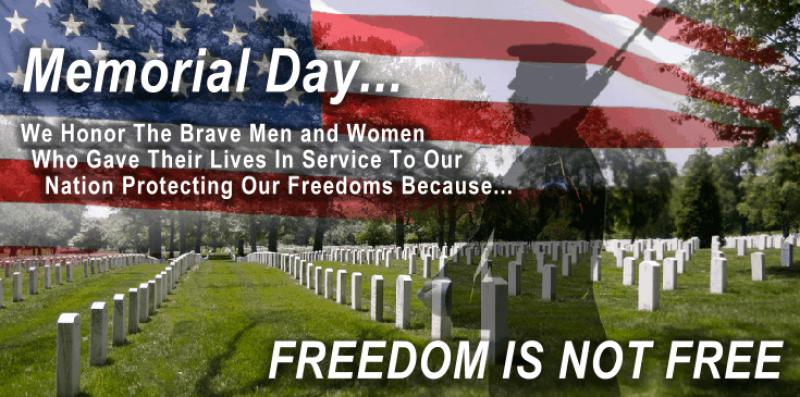Memorial Day Weekend


“We do not know one promise these men made, one pledge they gave, one word they spoke; but we do know they summed up and perfected, by one supreme act, the highest virtues of men and citizens. For love of country they accepted death, and thus resolved all doubts, and made immortal their patriotism and their virtue.”
– James A. Garfield, May 30, 1868, Arlington National Cemetery

Originally called Decoration Day, from the early tradition of decorating graves with flowers, wreaths and flags, Memorial Day is a day for remembrance of those who have died in service to our country. It was first widely observed on May 30, 1868 to commemorate the sacrifices of Civil War soldiers, by proclamation of Gen. John A. Logan of the Grand Army of the Republic, an organization of former Union sailors and soldiers.
During that first national commemoration, former Union Gen. and sitting Ohio Congressman James Garfield made a speech at Arlington National Cemetery, after which 5,000 participants helped to decorate the graves of the more than 20,000 Union and Confederate soldiers who were buried there.
This national event galvanized efforts to honor and remember fallen soldiers that began with local observances at burial grounds in several towns throughout the United States following the end of the Civil War, such as the May 1, 1865 gathering in Charleston, South Carolina organized by freed slaves to pay tribute and give proper burial to Union troops.
In 1873, New York was the first state to designate Memorial Day as a legal holiday. By the late 1800s, many more cities and communities observed Memorial Day, and several states had declared it a legal holiday.
After World War I, it became an occasion for honoring those who died in all of America’s wars and was then more widely established as a national holiday throughout the United States.




Let us take a moment this weekend to remember all those who gave their lives in service to this country. To those who's honorable service was more than an oath, but a belief that there is something great about this country and something worth dying for.
May they rest in peace and honor.
Amen
“Let us take a moment this weekend to remember all those who gave their lives in service to this country.”
Hear, Hear!
And let us also take a moment to remember their service and sacrifice in guaranteeing a voice to the voiceless, and a choice to the choice less…whether we agree or disagree with that voice or choice.
Rest well my brother.
A well deserved tribute. Thanks for sharing it and RIP Corporal.
We have the watch now.
Thank you for sharing this very moving service.
Utmost respect to my brothers and sisters who never made it home. We all thank you for your sacrifice.
This Is How the Poppy Became a Symbol for Fallen Troops
On Nov. 11, Americans celebrate veterans and honor those who served, but the date holds special meaning beyond our borders and around the world. In fact, the 11th of November is a solemn day to many of our nation's allies.
To them, it is Remembrance Day or Armistice Day, commemorating the end of World War I hostilities at the 11th hour, of the 11th day, of the 11th month in 1918. The red poppy became synonymous with the fallen troops during the First World War -- and has remained a symbol of their sacrifice ever since. But the poppies adopted this meaning because of the war poem "In Flanders Fields," written by the Canadian physician, Lt. Col. John McCrae.
McCrae's close friend, Alexis Helmer, was killed in action on May 2. He performed the burial service himself. As he laid his friend to rest, he saw beauty in the hellscape around him.
Red poppies are a hardy flower. Where the land had been destroyed by mortar fire, chlorine gas and countless other environmental concerns, the poppies grew around the graves; not even the high sodium or increased levels of lime could deter the red blooms.
The next day, in the back of an ambulance overlooking the battlefield, McCrae wrote what arguably became Canada's most well-known literary work.
“In Flanders fields the poppies grow
Between the crosses, row on row,
That mark our place; and in the sky
The larks, still bravely singing, fly
Scarce heard amid the guns below.
We are the Dead. Short days ago
We lived, felt dawn, saw sunset glow,
Loved and were loved, and now we lie
In Flanders fields.
Take up our quarrel with the foe:
To you from failing hands we throw
The torch; be yours to hold it high.
If ye break faith with us who die
We shall not sleep, though poppies grow
In Flanders fields.”
– "In Flanders Field" by John McCrae
McCrae was promoted to the consulting physician of the First British Army just four days before dying of pneumonia on Jan. 28, 1918. He would never know the end of the war or see the true impact of his poem. Canadians, Brits, Aussies and New Zealanders wear a red poppy to remember the fallen of all wars. Americans borrow from this tradition for Memorial Day.
Memorial Day in America falls on the last Monday of May -- and it’s no coincidence that it occurs during the time of year when flowers, including the red poppy, are most in bloom.
SOURCE: .
BUZZ NOTE:
In the event that you wear a poppy on Memorial Day, as the article said:
I posted this to explain where the tradition came from. The poem applies to all who had fallen in the pursuit of freedom.